
Fernando António Nogueira Pessoa was a Portuguese poet, writer, literary critic, translator, publisher, and philosopher, described as one of the most significant literary figures of the 20th century and one of the greatest poets in the Portuguese language. He also wrote in and translated from English and French.

Antero Tarquínio de Quental was a Portuguese poet, philosopher, and writer. De Quental is regarded as one of the greatest poets of his generation and is recognized as one of the most influential Portuguese language artists of all time. His name is often mentioned alongside Luís Vaz de Camões, Manuel Maria Barbosa du Bocage, and Fernando Pessoa.
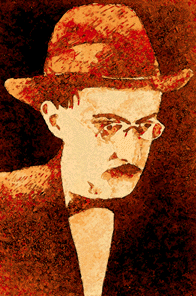
Álvaro de Campos was one of the poet Fernando Pessoa's various heteronyms, widely known by his powerful and wrathful writing style. According to his author, this alter ego was born in Tavira, Portugal, studied mechanical engineering and finally graduated in ship engineering in Glasgow. After a journey in Ireland, Campos sailed to the Orient and wrote his poem "Opiario" in the Suez Canal "onboard". He worked in 'Barrow-on-Furness' (sic) and Newcastle-on-Tyne (1922). Unemployed, Campos returned to Lisbon in 1926, where he lived ever since. He was born in October, 1890, but Pessoa didn't put an end to the life of Campos, so he would have survived his author who died in November, 1935. Campos' works may be split in three phases: the decadent phase, the futuristic phase and the decadent (sad) phase. He chose Whitman and Marinetti as masters, showing some similarities with their works, mainly in the second phase: hymns like "Ode Triunfal", "Ode Marítima", and "Ultimatum" praise the power of the rising technology, the strength of the machines, the dark side of the industrial civilization, and an enigmatic love for the machines. The first phase shared some of its pessimism with Pessoa's friend Mário de Sá-Carneiro, one of his co-workers in Orpheu magazine. In the last phase, Pessoa drops the mask, and reveals through Campos all the emptiness and nostalgia that grew during his last years of life. In his last phase Campos wrote the poems "Lisbon Revisited" and the well-known "Tobacco Shop".
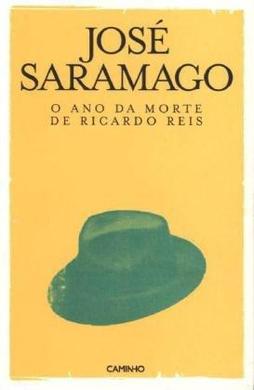
The Year of the Death of Ricardo Reis is a 1984 novel by the Portuguese novelist José Saramago, the 1998 Nobel Prize in Literature awardee. The book chronicles the final year in the life of the title character, Ricardo Reis, one of the many heteronyms used by the Portuguese writer Fernando Pessoa.
The literary concept of the heteronym refers to one or more imaginary character(s) created by a writer to write in different styles. Heteronyms differ from pen names in that the latter are just false names, while the former are characters that have their own supposed physiques, biographies, and writing styles.

Cesário Verde was a 19th-century Portuguese poet. His work, while mostly ignored during his lifetime and not well known outside of the country's borders even today, is generally considered to be amongst the most important in Portuguese poetry and is widely taught in schools. This is partly due to his being championed by many other authors after his death, notably Fernando Pessoa.

The Geração de Orpheu or Grupo de Orfeu were a Portuguese literary movement, largely responsible for the introduction of Modernism to the arts and letters of Portugal through their tri-monthly publication, Orpheu (magazine) (1915).

Alberto Caeiro is a heteronym which the Portuguese poet Fernando Pessoa began to use in 1914 and introduced in print in 1925. In his fictional biography, Caeiro was born in Lisbon on 16 April 1889, lived most his life in a village in Ribatejo and died in 1915. He was the leader and teacher of a group of neopagan poets and intellectuals that included Pessoa's other heteronyms António Mora, Ricardo Reis and Álvaro de Campos.

António Botto was a Portuguese aesthete and lyricist poet.
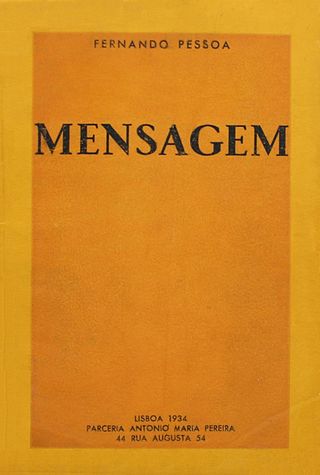
Mensagem is a book by Portuguese writer Fernando Pessoa. It is composed of 44 poems, and was called the "livro pequeno de poemas" or the "little book of poems". It was published in 1934 by Parceria António Maria Pereira. The book was awarded, in the same year, with the Prémio Antero de Quental in the poem category by the Secretariado Nacional de Informação of the Estado Novo.

The Book of Disquiet is a work by the Portuguese author Fernando Pessoa (1888–1935). Published posthumously, The Book of Disquiet is a fragmentary lifetime project, left unedited by the author, who introduced it as a "factless autobiography." The publication was credited to Bernardo Soares, one of the author's alternate writing names, which he called semi-heteronyms, and had a preface attributed to Fernando Pessoa, another alternate writing name or orthonym.

Delfim Pinto dos Santos (1907–1966), was a Portuguese academic, philosopher, educationist, essayist and book and movie reviewer.
Adolfo Vítor Casais Monteiro was a Portuguese essayist, poet and writer.
Manuel João Mendes Silva Ramos is a Portuguese anthropologist, artist and civil rights advocate. As an author, he is widely held in libraries worldwide.
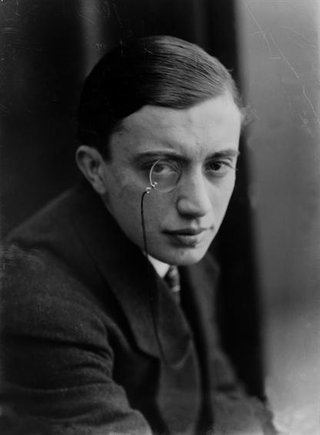
Luís de Montalvor was a pseudonym of Portuguese poet and editor Luís Filipe de Saldanha da Gama da Silva Ramos.
Sudoeste: cadernos de Almada Negreiros was a Portuguese review published in Lisbon in 1935. The magazine was an attempt to continue the Orpheu movement. It was headed by Almada Negreiros, in collaboration with Dário Martins, which put their knowledge in different forms of direct interventionism, contacts and its influences to the publication of the periodical.
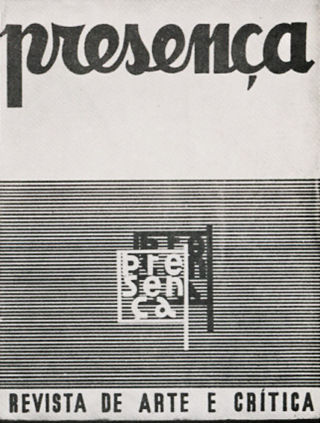
Presença - Folha de Arte e Crítica was a Portuguese magazine published in Coimbra from 10 March 1927 until 1940, producing a total of 54 issues during its existence.
Mundo literário: semanário de crítica e informação literária, científica e artística was a Portuguese review published in Lisbon from 1946 to 1948.

Manuela Porto was a Portuguese actor, writer, journalist, theatre critic, and translator, as well as a leading campaigner for women's rights and an opponent of the Estado Novo dictatorship in Portugal. As a translator she introduced previously untranslated women writers to Portuguese readers, including Louisa May Alcott, Anne Bronte, Elizabeth Gaskell, and Virginia Woolf. She is also credited with popularising the work of the Portuguese poet, Fernando Pessoa.

Manuela Nogueira is a Portuguese poet, and fiction and non-fiction writer of books for adults and children. Best known as the niece of the poet Fernando Pessoa (1888-1935), with whom she lived for much of the first ten years of her life, she has published several books about Pessoa and is frequently interviewed by the media about her uncle.















